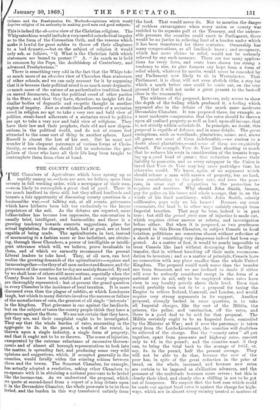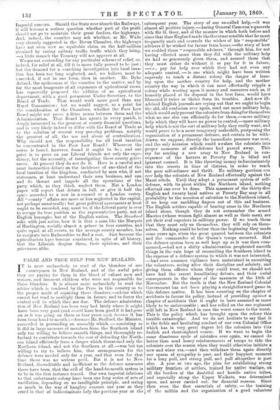THE COUNTY GRIEVANCE.
THE Chambers of Agriculture which have sprung up so rapidly among us,--there are now, we believe, more than seventy in full working order, with a newspaper of their own, —seem likely to accomplish a great deal of good. There is too much landlord in them still, but they afford landlords and tenants a fair opportunity of discussing county questions in a businesslike way,—of talking out, at all events, grievances which have hitherto been left too exclusively to the larger proprietors of the soil. As the debates are reported, mere talkee-talkee has become less oppressive, the conversation is usually brief, intelligent, and businesslike, and there is a growing tendency towards concrete suggestions, plans for actual legislation, for changes which, bad or good, are at least capable of being made. The agriculturists, in fact, instead of murmuring in a fashion more or less indistinct, are obtaining, through these Chambers, a power of intelligible or intelligent utterance which will, we believe, prove invaluable to them, and of which we earnestly recommend the present Liberal leaders to take heed. They, of all men, can best realize the growing demands of the agriculturists—squires and farmerstogether—for they of all men understand finance, and the grievances of the counties for to-dayare mainlyflnancial. By and by we shall hear of others still more serious, especially when the County Boards have been established and county ratepayers are thoroughly represented ; but at present the grand question in every Chamber is the incidence of local taxation. It is more discussed even than the plague of rabbits, at which Londoners laugh, but which in many districts involves the success or failure of the manufacture of corn, the greatest of all single "interests" in the kingdom. That grievance is one against the landlords, but on the subject of taxes the county people think they have a grievance against the State. We are not certain that they have, but they are, and their complaint ought to be investigated. They say that the whole burden of rates, amounting in the aggregate to 2s. in the pound, a tenth of the rental, is thrown upon a single industry, a single form of property, and that it ought not to be so thrown. The sense of injustice, exasperated by the extreme reluctance of successive Governments and of almost all borough representatives to look into the matter, is spreading fast, and producing some very wild opinions and suggestions, which, if accepted generally in the counties, would fatally widen the existing schism between them and the towns. The Somerset Chamber, for example, has actually adopted a resolution, asking other Chambers to co-operate with it in obtaining a national poor-rate to be levied like the income-tax. As we understand the proposal, which we quote at second-hand from a report of a long debate upon it in the Devonshire Chamber, the whole poor-rate is to be thus levied, and the burden in this way transferred entirely from
the land. That would never do. Not to mention the danger of reckless extravagance when every union or county was entitled to its separate pull at the Treasury, and the unbearable pressure the counties could exert in Parli4nent, there would be no justice in relieving land of a burden under which it has been transferred for three centuries. Ownership has many compensations, as all landlords know ; and occupancy, which has more claims to relief, would not be seriously relieved by any such measure. There are too many applications for every farm, and rents have shown too strong a tendency to rise, to give farmers any hope from a form of relief which, whatever its merits, would never be conceded by any Parliament now likely to sit in Westminster. That Parliament. it is clear, will not even abolish tithe, a step for which a much better case could be made out, on the very ground that it will not make a great present to the best-off class in the community.
The wildness of the proposal, however, only serves to show the depth of the feeling which produced it, a feeling which appeared also in the debate of the much more moderate Devonshire Chamber. It was proposed there, for example, as a most moderate compromise, that the rates should be thrown upon all realized property as well as land, upon all income, that is, not strictly within schedule D. In principle, no doubt, this proposal is capable of defence, and in some details. The great exemptions, such as woodlands, plantations, mines, and, above all, game, are most of them indefensible,—we confess to a doubt about plantations,—and sonic of them are exquisitely absurd. For example, Vere de Vere likes shooting so much that he reduces his rents in consideration of the tenants keeping up a good head of game ; that reduction reduces their liability to poor-rate, and so every ratepayer in the Union is taxed that Vere de Vere may bag more partridges than he otherwise would. We know, again, of no argument which should release a man with masses of property, but no land, from contributing to the police rate, and even the poorrate, in some sort of proportion to the protection he requires and receives. Why should John Smith, farmer, pay for police on his house and whole acreage, that is, on the whole of his fixed machinery, while John Smith, miserly millionaire, pays only on his house ? Because, say sonic economists, the land is in other ways unfairly exempt from Imperial taxation. That may be true, indeed is in part true ; but still the prinid, facie case of injustice is made out, which requires either answer or reform, and investigation before either. But when it is proposed, as two gentlemen proposed in this Devon Chamber, to subject Consols to local taxation, politicians are conscious almost without reflection of a shock as if something very dangerous indeed had been suggested. As a matter of fact, it would be nearly impossible to treat Consols like land without destroying the facility of transfer, that is, without knocking off their main recommendation to investors ; and as a matter of principle, Consols have no connection with any place smaller than the whole United Kingdom. The proposal would work worse than the broader one from Somerset, and we are inclined to doubt if either will ever be seriously considered except in the form of a national rate in aid, only to be employed when rates have risen in any locality greatly above their level. Even that would probably turn out to be a proposal for taxing the Empire to relieve Ireland, Cornwall, and London, and would require very strong arguments in its support. Another proposal, strongly backed in some quarters, is to take all Imperial charges, like the cost of the Militia, the prisons, the police, and vaccination, off the rates, and there is a good deal to be said for that proposal. The Militia certainly ought to be an Imperial force, controlled by the Minister at War ; and if ever the patronage is taken away from the Lords-Lieutenant, the counties will doubtless be relieved of the charge. But the "county rates" all put together, apart from poor-rate and highway rates, amount only to 4d. in the pound ; and the counties want, if they can, to bring the total back to the average of 1837, or, say, is. in the pound, half the present average. They will not be able to do that, because the cost of the poor has, in spite of the great reduction in the price of bread, on the whole, increased, and because new rates
are certain to be imposed as civilization advances, and the pressure of the multitude becomes more severe ; but this is
clearly their ideal, and clearly also a shilling is not to be got out of fourpence. We suspect that the best case which could be made out against local rates is against the charge for highways, which are in almost every country treated as matters of Imperial concern. Should the State ever absorb the Railways, it will become a serious question whether part of the profit should not go to maintain their great feeders, the highways. And, indeed„ the counties may ask whether, as Mr. Wade very cleverly suggested in the Devon Chamber, the highways have not even now an equitable claim on the half-million obtained by taxing railway traffic, traffic which they bring, —a little remark the Treasury will not approve at all.
We are not contending for any particular scheme of relief, or, indeed, for relief at all, till it is more fully proved to be just ; but the demand for a searching investigation into local taxation has been too long neglected, and, we believe, must be conceded, if not in one form, then in another. Mr. Dyke Aeland, the spokesman of the counties in the matter, and by far the most temperate of all exponents of agricultural views, has repeatedly proposed the addition of an agricultural department, with a good permanent Under-Secretary, to the Board of Trade. That would work more good than any Royal Commission: but we would suggest, as a point for the consideration of the Chambers, whether the Poor Law Board might not prove a fitter nexus between them and the Administration. That Board has agents in every parish, is deeply interested in the greatest of county financial questions, and is very likely indeed to differ with the Board of Trade as to the solution of several very pressing problems, notably the greatest of all, the use and abuse of centralization. Why should not the responsibility for all local taxation be confeentrated in the Poor Law Board ? Wherever the nexus is found, however, found it ought to be ; and our point is to press on our Liberal friends not only the expediency, but the necessity, of investigating these county grievances. At present they do not do it. Here is a careful and most instructive debate on the incidence of one-third of the local taxation of the kingdom, conducted by men who, if not statesmen, at least understand their own business, and can and do thwart and impede all the operations of the party which, as they think, neglect them. Not a London paper will report that debate in full, or give it half the space accorded to a row in a council or a London vestry. All "county" affairs are more or less neglected in the capital, not perhaps unnaturally; but great political movements at least ought to be recorded, nay, must be, if the Liberal party is ever to occupy its true position as the representative party, not of English boroughs, but of the English nation. The Standard asks, with just satire, how it is that a man like the Marquis of Hartington, socially almost a prince in four counties, and quite equal, at all events, to the average county member, has to emigrate into Radnorshire to find a seat. Just because the agriculturists have become convinced, in spite of all history, that the Liberals despise them, their opinions, and their grievances alike.































 Previous page
Previous page